初高中衔接语音课件(共18张PPT)
文档属性
| 名称 | 初高中衔接语音课件(共18张PPT) | 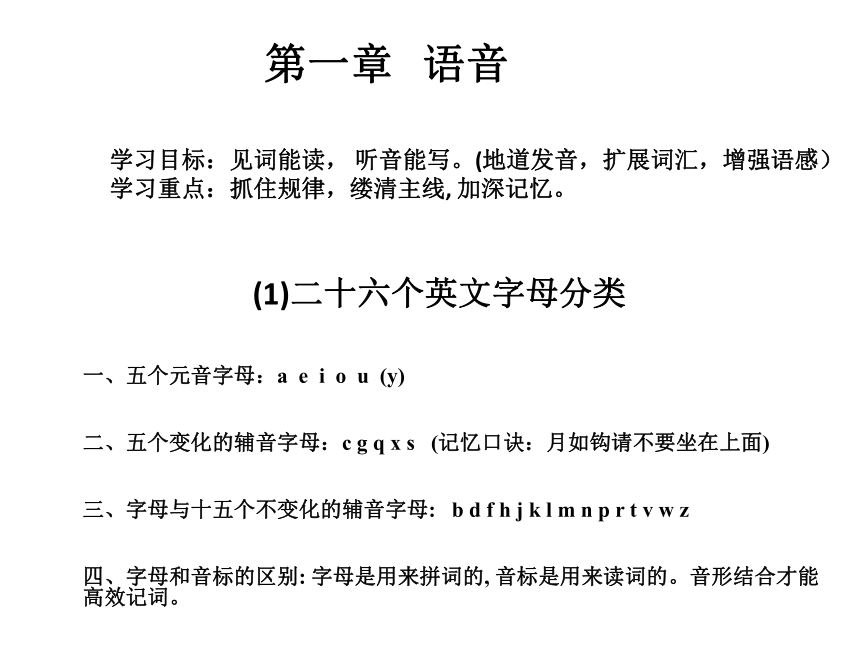 | |
| 格式 | pptx | ||
| 文件大小 | 150.3KB | ||
| 资源类型 | 教案 | ||
| 版本资源 | 人教版(2019) | ||
| 科目 | 英语 | ||
| 更新时间 | 2023-06-23 17:58:15 | ||
图片预览

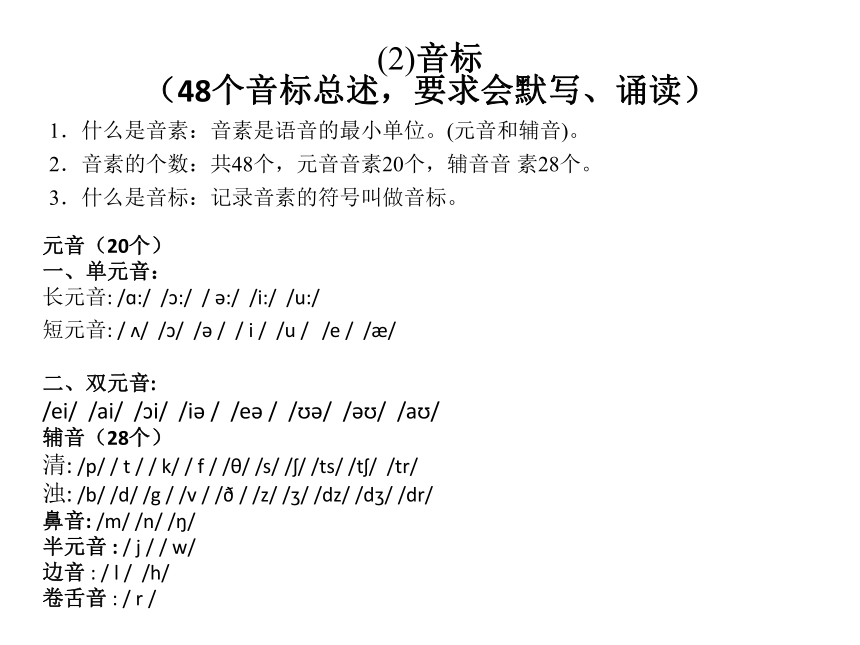
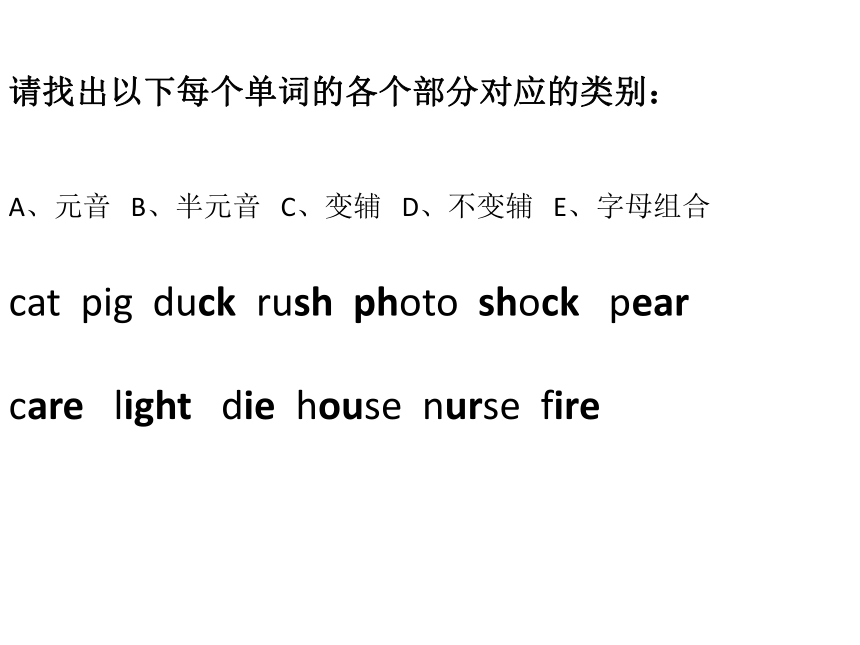
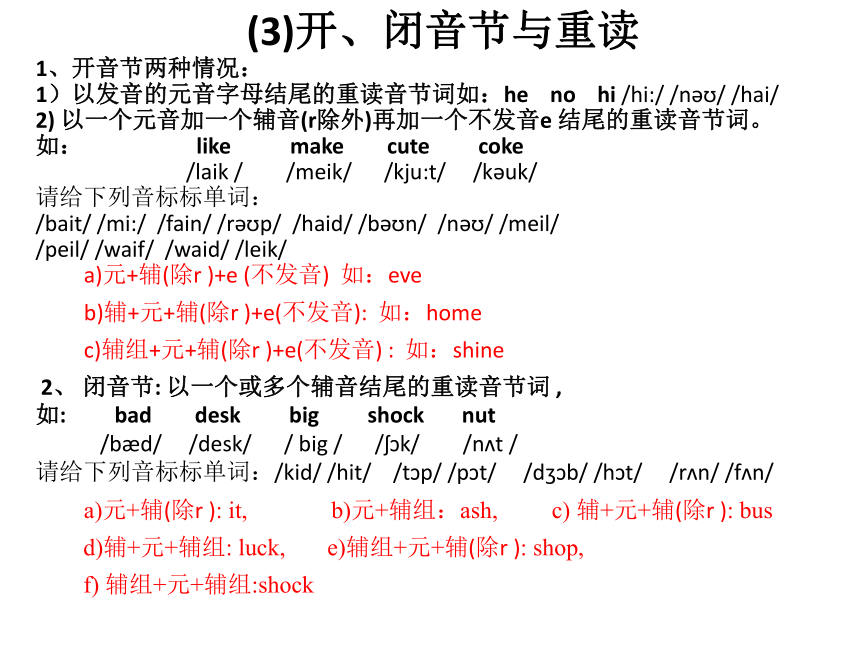
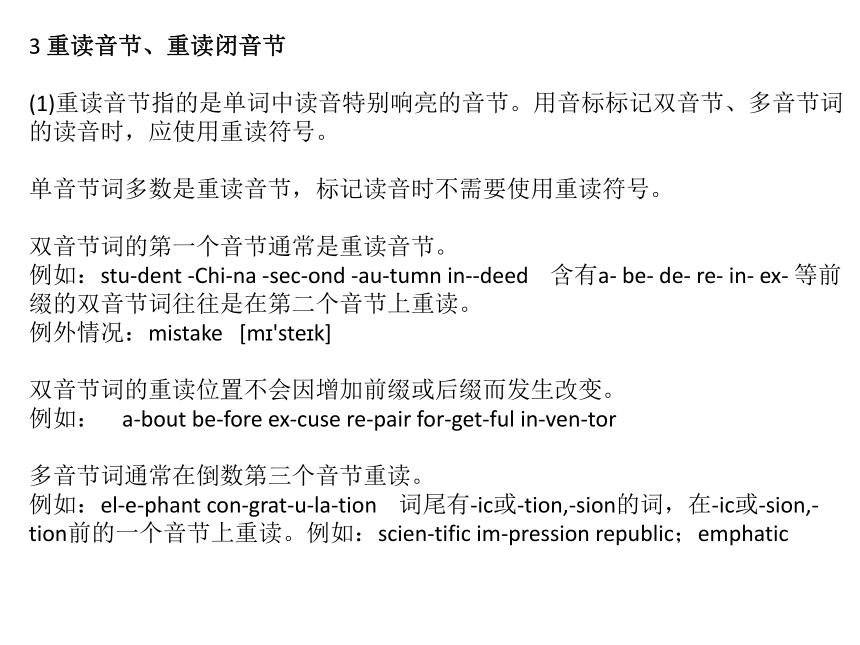
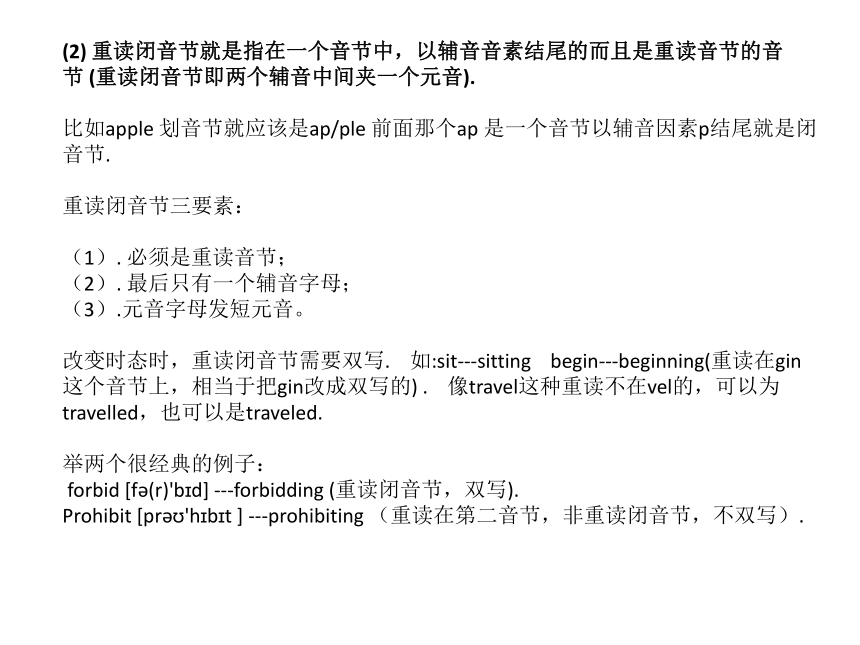
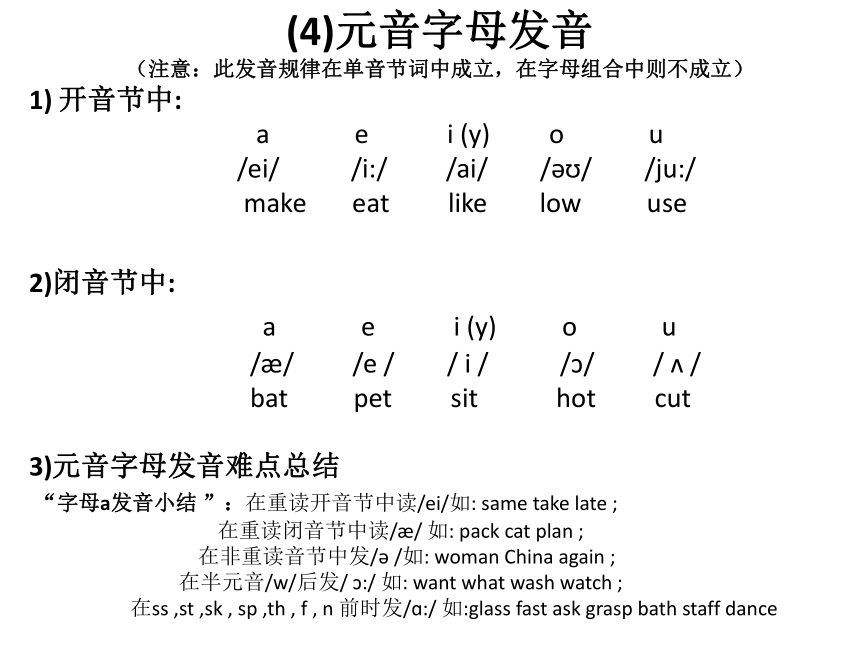
文档简介
(共18张PPT)
第一章 语音
学习目标:见词能读, 听音能写。(地道发音,扩展词汇,增强语感)
学习重点:抓住规律,缕清主线, 加深记忆。
(1)二十六个英文字母分类
一、五个元音字母:a e i o u (y)
二、五个变化的辅音字母:c g q x s (记忆口诀:月如钩请不要坐在上面)
三、字母与十五个不变化的辅音字母: b d f h j k l m n p r t v w z
四、字母和音标的区别: 字母是用来拼词的, 音标是用来读词的。音形结合才能高效记词。
(2)音标
(48个音标总述,要求会默写、诵读)
1.什么是音素:音素是语音的最小单位。(元音和辅音)。
2.音素的个数:共48个,元音音素20个,辅音音 素28个。
3.什么是音标:记录音素的符号叫做音标。
元音(20个)
一、单元音:
长元音: /ɑ:/ / :/ / :/ /i:/ /u:/
短元音: / / / / / / / i / /u / /e / / /
二、双元音:
/ei/ /ai/ / i/ /i / /e / / / / / /a /
辅音(28个)
清: /p/ / t / / k/ / f / /θ/ /s/ / / /ts/ /t / /tr/
浊: /b/ /d/ /g / /v / / / /z/ / / /dz/ /d / /dr/
鼻音: /m/ /n/ / /
半元音 : / j / / w/
边音 : / l / /h/
卷舌音 : / r /
请找出以下每个单词的各个部分对应的类别:
A、元音 B、半元音 C、变辅 D、不变辅 E、字母组合
cat pig duck rush photo shock pear
care light die house nurse fire
(3)开、闭音节与重读
1、开音节两种情况:
1)以发音的元音字母结尾的重读音节词如:he no hi /hi:/ /n / /hai/
2) 以一个元音加一个辅音(r除外)再加一个不发音e 结尾的重读音节词。
如: like make cute coke
/laik / /meik/ /kju:t/ /k uk/
请给下列音标标单词:
/bait/ /mi:/ /fain/ /r p/ /haid/ /b n/ /n / /meil/
/peil/ /waif/ /waid/ /leik/
a)元+辅(除r )+e (不发音) 如:eve
b)辅+元+辅(除r )+e(不发音): 如:home
c)辅组+元+辅(除r )+e(不发音) : 如:shine
2、 闭音节: 以一个或多个辅音结尾的重读音节词 ,
如: bad desk big shock nut
/b d/ /desk/ / big / / k/ /n t /
请给下列音标标单词:/kid/ /hit/ /t p/ /p t/ /d b/ /h t/ /r n/ /f n/
a)元+辅(除r ): it, b)元+辅组:ash, c) 辅+元+辅(除r ): bus
d)辅+元+辅组: luck, e)辅组+元+辅(除r ): shop,
f) 辅组+元+辅组:shock
3 重读音节、重读闭音节
(1)重读音节指的是单词中读音特别响亮的音节。用音标标记双音节、多音节词的读音时,应使用重读符号。
单音节词多数是重读音节,标记读音时不需要使用重读符号。
双音节词的第一个音节通常是重读音节。
例如:stu-dent -Chi-na -sec-ond -au-tumn in--deed 含有a- be- de- re- in- ex- 等前缀的双音节词往往是在第二个音节上重读。
例外情况:mistake [m 'ste k]
双音节词的重读位置不会因增加前缀或后缀而发生改变。
例如: a-bout be-fore ex-cuse re-pair for-get-ful in-ven-tor
多音节词通常在倒数第三个音节重读。
例如:el-e-phant con-grat-u-la-tion 词尾有-ic或-tion,-sion的词,在-ic或-sion,-tion前的一个音节上重读。例如:scien-tific im-pression republic;emphatic
(2) 重读闭音节就是指在一个音节中,以辅音音素结尾的而且是重读音节的音节 (重读闭音节即两个辅音中间夹一个元音).
比如apple 划音节就应该是ap/ple 前面那个ap 是一个音节以辅音因素p结尾就是闭音节.
重读闭音节三要素:
(1). 必须是重读音节;
(2). 最后只有一个辅音字母;
(3).元音字母发短元音。
改变时态时,重读闭音节需要双写. 如:sit---sitting begin---beginning(重读在gin这个音节上,相当于把gin改成双写的) . 像travel这种重读不在vel的,可以为travelled,也可以是traveled.
举两个很经典的例子:
forbid [f (r)'b d] ---forbidding (重读闭音节,双写).
Prohibit [pr 'h b t ] ---prohibiting (重读在第二音节,非重读闭音节,不双写).
(4)元音字母发音
(注意:此发音规律在单音节词中成立,在字母组合中则不成立)
1) 开音节中:
a e i (y) o u
/ei/ /i:/ /ai/ / / /ju:/
make eat like low use
2)闭音节中:
a e i (y) o u
/ / /e / / i / / / / /
bat pet sit hot cut
3)元音字母发音难点总结
“字母a发音小结 ”:在重读开音节中读/ei/如: same take late ;
在重读闭音节中读/ / 如: pack cat plan ;
在非重读音节中发/ /如: woman China again ;
在半元音/w/后发/ :/ 如: want what wash watch ;
在ss ,st ,sk , sp ,th , f , n 前时发/ɑ:/ 如:glass fast ask grasp bath staff dance
“字母e发音小结”:
在重读开音节中读/i:/ 如: we these he ;
在重读闭音节中读/e /如: pen best well;
在非重读音节中发/ /如: silence open ;
前缀和后缀中读/ i /如: decision behind careless
“字母i、o发音小结”:
字母i 在重读开音节中读/ai/如: like fine time ;
在重读闭音节中和非重读音节中发/ i /如: hit think morning
字母o 在重读开音节或在某些词尾中读/ / 如: no note coke ;
在重读闭音节中/ /如: hot not shop ;在非重读音节中发/ /如: second kingdom
“字母u发音小结”:
在重读开音节或在某些词尾中读/ju:/ 如: student use mule ;
在重读闭音节中/ /如: sun but bus;在某些词中发/u /如: full put push pull ;
非重读音节中发/ /如: autumn suppose difficult
(5) 元音字母组合发音
1).常见发音固定的双元音字母组合
ai ay ey ee oi oy oa aw
/ei/ /ei/ /ei/ / i:/ / i/ / i/ / u/ / :/
Wait train brain daily fail gain jail mail nail pain rain sail vain …
Day play pray hay bay gay lay may pay ray way
Bee fee free need meet needle leech
Voice coin noise soil spoil foil poison
Boy toy annoy destroy enjoy …
2). 常见发音有变化的双元音字母组合
oo 有三种发音: / u:/ / u / / / , 如: food , good , flood ;
ea 有四种发音: /e // i:/ /i / /ei/ , 如: bread , please , idea , great ;
ow有两种发音: / / /a / , 如: show , town ;
ou有四种发音: /a / / / /u:/,/ / 如: house , touch , soup , soul;
ie有三种发音: /ai/ /i:/ /ai /,如: tie , believe , quiet
ui有三种发音: / u:/ /ju:/ /i / ,如: fruit , suit , biscuit
ew有二种发音: / u:/ /ju:/ 如: flew , few
ue有二种发音: / u:/ /ju:/ 如: blue , Tuesday
3)单元音字母的 r 音节发音
ar er ir or ur
/ɑ:/ / :/ / :/ / :/ / :/
注意:
1、ar 在半元音后是得变音为/ :/ 或/ / 如: war , warn , warm ;
2、or 则变为/ :/ 如:word work
3、er 在词末时才发短音/ / ;如: worker, dealer
4) 单元音字母的 re 音节发音
are ere ire ore ure
/e / / i / /ai / / :/ /ju: /
注意:掌握半元音/w/后的变音现象:
1、ere 在半元音/w/或咬舌音后时要变音发/e / ; ure 在/ / 后时发/ / ; 如:where , there ; sure , ensure
2、类似现象 : ar or a等在半元音/w/ 后也要变音, 如 : warm warn ; world word ;
was want , what watch , wash , water
5) 双元音字母的 r 音节发音
air /e / hair
eer /i / beer
ear 有四种发音: /e / /i / / ://ɑ:/, 如: bear , hear , early ,heart
oor 有两种发音: / :/ / / 如: floor , poor
our有两种发音: / :/ /a / / / 如: four , hour , tour
6) 元辅音字母组合
al oul old ind ild ance eigh igh ough augh
[ ]/
[ ] [a ] [ ld] [a nd] [a ld] [ɑ ns] [e ] [a ] [ ]/[u ]/[ :] [ɑ ]/[ :]
could/ wind/ though/ laugh/
all foul fold wind child dance eight high through caught
fought
(6)辅音字母发音
1).不变化的辅音字母发音
b d f h j k l m
/b/ /d/ /f/ /h/ /d / /k/ /l/ /m/
n p r t v w z
/n/ /p/ /r/ /t/ /v/ /w/ /z/
2).变化的辅音字母发音 ( c g q x s )
a. 字母C的发音规律: c 有三种发音:在e, i , y前时发/s/,如: nice[na s], city [ ‘s t ], bicycle [’ba s kl];在 a, o, u 前或后为辅音字母时发/ k/ ,如: cake [ke k]; 在字母组合ia, ie, 和 ea前时则发/ / ,如: facial ['fe l], ancient ['e n nt], ocean [' n]
在每组里找出字母C不同的发音:
1、cap cup cat cent
2、cake cave coke face
3、nice rice race camp
b.字母G的发音规律: g 在e前时发/d / ,如: bridge [br d ],在e i y 前有两种发音 : /d / 或 /g / , 如:gin[d n], gift[g ft], gym[d m]; 一般只发/g / ; 如:gap[g p], egg[eg]
在每组里找出字母G不同的发音:
1、huge page wage gate
2、egg age dog big
3、game god gun gym
c.字母Q的发音规律: q 一般与u连用即qu 有两种发音 : 在词首时发 /kw/ ,如: quite [kwa t], square [skwe ] ; 在词末时发 /k/ 如: unique [ju 'n k], antique[ n'ti k]
d.字母X 的发音规律: x 有两种发音 : /ks/ /gz/ 如: box [b ks] , exercise ['eks sa z] ; exam [ g'z m], exact [ g'z kt]
e.字母S的发音规律: s 有四种发音 : /s/, /z/ 和/ / / /如: snow [sn ], has [h z], sure [ ],sugar [' g (r)] ,usually ['ju ( ) l ]
在每组里找出字母G不同的发音: 1、sad sun use safe
2、boss miss pass vase
3、glass rise sand same
4、nose kiss sell send
(7)辅音字母组合的发音
1)常见发音固定的辅音字母组合
ck ss sh tr dr tw tch nk ph wr kn
[k] [s] [ ] [tr] [dr] [tw] [t ] [ k] [ f ] [ r] [n]
black kiss she try dry twin watch ink photo write know
2) 常见发音有变化的辅音字母组合
th ch wh ng
[θ] / [ ] [t ] /[k] [w]/[h] (在字母o前) [ ](在词尾)/ [ g] (在词中)
think / this chat / Christ which/who angle / long
3) 辅音字母组合发音连滑现象
指发第一个字母音时轻而短 促,以便更快过渡至第二个字母音的现象
bl-/br- fl-/fr- cl-/cr- pl-/pr- gl-/gr-
[bl]/[br] [fl]/[fr] [kl]/[kr] [pl]/[pr] [gl]/[gr]
blow/brave flag/frog clap/crop plane/price glass/grass
4) 辅音字母组合发音浊化现象
指当sp, sk, st 位于词首,后接元音且所在音节为重读音节时,[s]后面的清辅音发生浊化读成相应的浊辅音,即sp-读成[sb], sk-读成[sg],st- 读成[sd]的现象。
例如:spy , skate, stamp
(8)特殊的发音规律
1、字母组合ere 原来发/i /音如: here , mere ; 在半元音/w/或咬舌音后时要变音发/e /如:where , there ;
2、字母组合ure 原本发/ju: /音如:cure , lure, 但在/ / 后时则发/ /如: sure , ensure ;
3、字母组合mb在词末时, b受m影响要闭嘴不发音如: climb , tomb , comb ,lamb ,bomb ; 注意: b不发音
4、字母组合al 原本发/ :/音, 如:fall , talk , walk , mall , chalk ; 但在m f 前时发/a:/音, 如: palm , calm , half
5、字母组合or原本发/ :/音 如:for ,torch ; 但在半元音/w/后时则需发 / :/ 音如:work ,worm ;
6、字母组合ar原来发 /a:./ 如: car , far , bar , farm , jar ; 但在半元音/w/ 后要变/ :/音 如 : warm warn , war ;
7、字母组合ch有三种发音 :分别是 /k/ / / /t / 如: chemical
8、字母y在词首时发/ j /如: young , yellow ; 在词中或词末时发/ai/ 或 / i / 的音 如: my , fly ,sky , happy ,city
9、字母组合th 的专利是咬舌音/θ/ / /;如: think , that , father , neither 但有例外如: Thailand /t/
10、字母组合wh在o前时要发 /h/如:who , whose ,whole ; 否则发/w/ 如: when , what , which
11、字母组合ng ,在词末时发 / / 如:sing song ring wing ; 在词中时发/ g / 如: English language
12、字母a 在ss , st , sk , sp , th ,f ,n 前时的发/a:/音如: class last task grasp bath staff dance …;但在半元音/w/后时得发/ :/或/ /音如: water ; was ,wash , watch , want
(9)绕口令
1[b]. Bill's big brother is building a beautiful building between two big brick block.
Bill's big brother is building
/bilz/ /big/ /br / /is/ /bju:ldi /
a beautiful building between two
/ //bju:t ful//bju:ldi //bitwi:n/ /tu:/
big brick blocks.
/big/ /brik/ /bl ks/
A big black bug bit a big black dog on his big black nose!
2[w]. While we were walking, we were watching window washers wash Washington's windows with warm washing water
While we were walking, we
/wail/ /wi:/ /w :/ /w :jki / /wi:/
were watching window washers
/w :/ /w t i / /wind / /w z/
wash Washington's windows with
/w / /w i t nz/ /wind z/ /wi /
warm washing water
/w m/ /w i / /w :t /
What, why, when and where are the words we require quite often when we want to ask a question.
3[ ] [s]. She sells seashells by the sea shore. The shells she sells are surely seashells. So if she sells shells on the seashore, I'm sure she sells seashore shells.
She sells seashells by the sea
/ i:/ /selz/ /si: elz/ /bai/ / / /si:/
shore. The shells she sells are
/ :/ / / / elz/ / i:/ /selz/ /a:/
surely seashells. So if she sells
/ u li/ /si: elz/ /s u//if // i:/ /selz/
shells on the seashore, I'm sure
/selz/ / n/ / / /si :/ /ai m/ / u /
she sells seashore shells.
/ i:/ /selz/ / si :/ / elz/
4[ai]. I drive five miles on Friday night to see a fight that I like .
I drive five miles on Friday
/ai/ /draiv/ /faiv/ /mailz/ / n/ /fraidei/
night to see a fight that I like .
/nait/ /tu:/ /si:/ / / /fait/ / t/ /ai/ /laik/
5[k] [g]. Good cookies could be cooked by a good cook, if a good cook could cook good cookies.
6[p]. Peter Piper picked a peck of pickle prepared by his parents and put them in a big paper plate.
7[t]. Too many teenagers tend to waste their time watching television.
8[d]. Dick's daughter Dianna doesn't like dancing.
9[z]. Another zippy zappy crazy day comes to a close . As we zoom up to Joe’s snooze zone , Zoe Jone ’ s of Zodiac Zoo plays with her zipper.
10[r]. Richard and Brooke took a ride in their brand new Range Rover Truck .
11[a:]. A large army marched past the farmyard.
12[ ] . When a doctor doctors another doctor, does he doctor the doctored doctor the way the doctored doctor wants to be doctored or does he doctor the doctored doctor the way the doctoring doctor wants to doctor the doctor
13[[t ]. How many wood would a wood chuck chuck if a wood chuck could chuck wood He'd chuck as much wood as a woodchuck could chuck wood.
14[θ]. There are thirty-three thousand three hundred and thirty-there feathers on that thrush's throat.
第一章 语音
学习目标:见词能读, 听音能写。(地道发音,扩展词汇,增强语感)
学习重点:抓住规律,缕清主线, 加深记忆。
(1)二十六个英文字母分类
一、五个元音字母:a e i o u (y)
二、五个变化的辅音字母:c g q x s (记忆口诀:月如钩请不要坐在上面)
三、字母与十五个不变化的辅音字母: b d f h j k l m n p r t v w z
四、字母和音标的区别: 字母是用来拼词的, 音标是用来读词的。音形结合才能高效记词。
(2)音标
(48个音标总述,要求会默写、诵读)
1.什么是音素:音素是语音的最小单位。(元音和辅音)。
2.音素的个数:共48个,元音音素20个,辅音音 素28个。
3.什么是音标:记录音素的符号叫做音标。
元音(20个)
一、单元音:
长元音: /ɑ:/ / :/ / :/ /i:/ /u:/
短元音: / / / / / / / i / /u / /e / / /
二、双元音:
/ei/ /ai/ / i/ /i / /e / / / / / /a /
辅音(28个)
清: /p/ / t / / k/ / f / /θ/ /s/ / / /ts/ /t / /tr/
浊: /b/ /d/ /g / /v / / / /z/ / / /dz/ /d / /dr/
鼻音: /m/ /n/ / /
半元音 : / j / / w/
边音 : / l / /h/
卷舌音 : / r /
请找出以下每个单词的各个部分对应的类别:
A、元音 B、半元音 C、变辅 D、不变辅 E、字母组合
cat pig duck rush photo shock pear
care light die house nurse fire
(3)开、闭音节与重读
1、开音节两种情况:
1)以发音的元音字母结尾的重读音节词如:he no hi /hi:/ /n / /hai/
2) 以一个元音加一个辅音(r除外)再加一个不发音e 结尾的重读音节词。
如: like make cute coke
/laik / /meik/ /kju:t/ /k uk/
请给下列音标标单词:
/bait/ /mi:/ /fain/ /r p/ /haid/ /b n/ /n / /meil/
/peil/ /waif/ /waid/ /leik/
a)元+辅(除r )+e (不发音) 如:eve
b)辅+元+辅(除r )+e(不发音): 如:home
c)辅组+元+辅(除r )+e(不发音) : 如:shine
2、 闭音节: 以一个或多个辅音结尾的重读音节词 ,
如: bad desk big shock nut
/b d/ /desk/ / big / / k/ /n t /
请给下列音标标单词:/kid/ /hit/ /t p/ /p t/ /d b/ /h t/ /r n/ /f n/
a)元+辅(除r ): it, b)元+辅组:ash, c) 辅+元+辅(除r ): bus
d)辅+元+辅组: luck, e)辅组+元+辅(除r ): shop,
f) 辅组+元+辅组:shock
3 重读音节、重读闭音节
(1)重读音节指的是单词中读音特别响亮的音节。用音标标记双音节、多音节词的读音时,应使用重读符号。
单音节词多数是重读音节,标记读音时不需要使用重读符号。
双音节词的第一个音节通常是重读音节。
例如:stu-dent -Chi-na -sec-ond -au-tumn in--deed 含有a- be- de- re- in- ex- 等前缀的双音节词往往是在第二个音节上重读。
例外情况:mistake [m 'ste k]
双音节词的重读位置不会因增加前缀或后缀而发生改变。
例如: a-bout be-fore ex-cuse re-pair for-get-ful in-ven-tor
多音节词通常在倒数第三个音节重读。
例如:el-e-phant con-grat-u-la-tion 词尾有-ic或-tion,-sion的词,在-ic或-sion,-tion前的一个音节上重读。例如:scien-tific im-pression republic;emphatic
(2) 重读闭音节就是指在一个音节中,以辅音音素结尾的而且是重读音节的音节 (重读闭音节即两个辅音中间夹一个元音).
比如apple 划音节就应该是ap/ple 前面那个ap 是一个音节以辅音因素p结尾就是闭音节.
重读闭音节三要素:
(1). 必须是重读音节;
(2). 最后只有一个辅音字母;
(3).元音字母发短元音。
改变时态时,重读闭音节需要双写. 如:sit---sitting begin---beginning(重读在gin这个音节上,相当于把gin改成双写的) . 像travel这种重读不在vel的,可以为travelled,也可以是traveled.
举两个很经典的例子:
forbid [f (r)'b d] ---forbidding (重读闭音节,双写).
Prohibit [pr 'h b t ] ---prohibiting (重读在第二音节,非重读闭音节,不双写).
(4)元音字母发音
(注意:此发音规律在单音节词中成立,在字母组合中则不成立)
1) 开音节中:
a e i (y) o u
/ei/ /i:/ /ai/ / / /ju:/
make eat like low use
2)闭音节中:
a e i (y) o u
/ / /e / / i / / / / /
bat pet sit hot cut
3)元音字母发音难点总结
“字母a发音小结 ”:在重读开音节中读/ei/如: same take late ;
在重读闭音节中读/ / 如: pack cat plan ;
在非重读音节中发/ /如: woman China again ;
在半元音/w/后发/ :/ 如: want what wash watch ;
在ss ,st ,sk , sp ,th , f , n 前时发/ɑ:/ 如:glass fast ask grasp bath staff dance
“字母e发音小结”:
在重读开音节中读/i:/ 如: we these he ;
在重读闭音节中读/e /如: pen best well;
在非重读音节中发/ /如: silence open ;
前缀和后缀中读/ i /如: decision behind careless
“字母i、o发音小结”:
字母i 在重读开音节中读/ai/如: like fine time ;
在重读闭音节中和非重读音节中发/ i /如: hit think morning
字母o 在重读开音节或在某些词尾中读/ / 如: no note coke ;
在重读闭音节中/ /如: hot not shop ;在非重读音节中发/ /如: second kingdom
“字母u发音小结”:
在重读开音节或在某些词尾中读/ju:/ 如: student use mule ;
在重读闭音节中/ /如: sun but bus;在某些词中发/u /如: full put push pull ;
非重读音节中发/ /如: autumn suppose difficult
(5) 元音字母组合发音
1).常见发音固定的双元音字母组合
ai ay ey ee oi oy oa aw
/ei/ /ei/ /ei/ / i:/ / i/ / i/ / u/ / :/
Wait train brain daily fail gain jail mail nail pain rain sail vain …
Day play pray hay bay gay lay may pay ray way
Bee fee free need meet needle leech
Voice coin noise soil spoil foil poison
Boy toy annoy destroy enjoy …
2). 常见发音有变化的双元音字母组合
oo 有三种发音: / u:/ / u / / / , 如: food , good , flood ;
ea 有四种发音: /e // i:/ /i / /ei/ , 如: bread , please , idea , great ;
ow有两种发音: / / /a / , 如: show , town ;
ou有四种发音: /a / / / /u:/,/ / 如: house , touch , soup , soul;
ie有三种发音: /ai/ /i:/ /ai /,如: tie , believe , quiet
ui有三种发音: / u:/ /ju:/ /i / ,如: fruit , suit , biscuit
ew有二种发音: / u:/ /ju:/ 如: flew , few
ue有二种发音: / u:/ /ju:/ 如: blue , Tuesday
3)单元音字母的 r 音节发音
ar er ir or ur
/ɑ:/ / :/ / :/ / :/ / :/
注意:
1、ar 在半元音后是得变音为/ :/ 或/ / 如: war , warn , warm ;
2、or 则变为/ :/ 如:word work
3、er 在词末时才发短音/ / ;如: worker, dealer
4) 单元音字母的 re 音节发音
are ere ire ore ure
/e / / i / /ai / / :/ /ju: /
注意:掌握半元音/w/后的变音现象:
1、ere 在半元音/w/或咬舌音后时要变音发/e / ; ure 在/ / 后时发/ / ; 如:where , there ; sure , ensure
2、类似现象 : ar or a等在半元音/w/ 后也要变音, 如 : warm warn ; world word ;
was want , what watch , wash , water
5) 双元音字母的 r 音节发音
air /e / hair
eer /i / beer
ear 有四种发音: /e / /i / / ://ɑ:/, 如: bear , hear , early ,heart
oor 有两种发音: / :/ / / 如: floor , poor
our有两种发音: / :/ /a / / / 如: four , hour , tour
6) 元辅音字母组合
al oul old ind ild ance eigh igh ough augh
[ ]/
[ ] [a ] [ ld] [a nd] [a ld] [ɑ ns] [e ] [a ] [ ]/[u ]/[ :] [ɑ ]/[ :]
could/ wind/ though/ laugh/
all foul fold wind child dance eight high through caught
fought
(6)辅音字母发音
1).不变化的辅音字母发音
b d f h j k l m
/b/ /d/ /f/ /h/ /d / /k/ /l/ /m/
n p r t v w z
/n/ /p/ /r/ /t/ /v/ /w/ /z/
2).变化的辅音字母发音 ( c g q x s )
a. 字母C的发音规律: c 有三种发音:在e, i , y前时发/s/,如: nice[na s], city [ ‘s t ], bicycle [’ba s kl];在 a, o, u 前或后为辅音字母时发/ k/ ,如: cake [ke k]; 在字母组合ia, ie, 和 ea前时则发/ / ,如: facial ['fe l], ancient ['e n nt], ocean [' n]
在每组里找出字母C不同的发音:
1、cap cup cat cent
2、cake cave coke face
3、nice rice race camp
b.字母G的发音规律: g 在e前时发/d / ,如: bridge [br d ],在e i y 前有两种发音 : /d / 或 /g / , 如:gin[d n], gift[g ft], gym[d m]; 一般只发/g / ; 如:gap[g p], egg[eg]
在每组里找出字母G不同的发音:
1、huge page wage gate
2、egg age dog big
3、game god gun gym
c.字母Q的发音规律: q 一般与u连用即qu 有两种发音 : 在词首时发 /kw/ ,如: quite [kwa t], square [skwe ] ; 在词末时发 /k/ 如: unique [ju 'n k], antique[ n'ti k]
d.字母X 的发音规律: x 有两种发音 : /ks/ /gz/ 如: box [b ks] , exercise ['eks sa z] ; exam [ g'z m], exact [ g'z kt]
e.字母S的发音规律: s 有四种发音 : /s/, /z/ 和/ / / /如: snow [sn ], has [h z], sure [ ],sugar [' g (r)] ,usually ['ju ( ) l ]
在每组里找出字母G不同的发音: 1、sad sun use safe
2、boss miss pass vase
3、glass rise sand same
4、nose kiss sell send
(7)辅音字母组合的发音
1)常见发音固定的辅音字母组合
ck ss sh tr dr tw tch nk ph wr kn
[k] [s] [ ] [tr] [dr] [tw] [t ] [ k] [ f ] [ r] [n]
black kiss she try dry twin watch ink photo write know
2) 常见发音有变化的辅音字母组合
th ch wh ng
[θ] / [ ] [t ] /[k] [w]/[h] (在字母o前) [ ](在词尾)/ [ g] (在词中)
think / this chat / Christ which/who angle / long
3) 辅音字母组合发音连滑现象
指发第一个字母音时轻而短 促,以便更快过渡至第二个字母音的现象
bl-/br- fl-/fr- cl-/cr- pl-/pr- gl-/gr-
[bl]/[br] [fl]/[fr] [kl]/[kr] [pl]/[pr] [gl]/[gr]
blow/brave flag/frog clap/crop plane/price glass/grass
4) 辅音字母组合发音浊化现象
指当sp, sk, st 位于词首,后接元音且所在音节为重读音节时,[s]后面的清辅音发生浊化读成相应的浊辅音,即sp-读成[sb], sk-读成[sg],st- 读成[sd]的现象。
例如:spy , skate, stamp
(8)特殊的发音规律
1、字母组合ere 原来发/i /音如: here , mere ; 在半元音/w/或咬舌音后时要变音发/e /如:where , there ;
2、字母组合ure 原本发/ju: /音如:cure , lure, 但在/ / 后时则发/ /如: sure , ensure ;
3、字母组合mb在词末时, b受m影响要闭嘴不发音如: climb , tomb , comb ,lamb ,bomb ; 注意: b不发音
4、字母组合al 原本发/ :/音, 如:fall , talk , walk , mall , chalk ; 但在m f 前时发/a:/音, 如: palm , calm , half
5、字母组合or原本发/ :/音 如:for ,torch ; 但在半元音/w/后时则需发 / :/ 音如:work ,worm ;
6、字母组合ar原来发 /a:./ 如: car , far , bar , farm , jar ; 但在半元音/w/ 后要变/ :/音 如 : warm warn , war ;
7、字母组合ch有三种发音 :分别是 /k/ / / /t / 如: chemical
8、字母y在词首时发/ j /如: young , yellow ; 在词中或词末时发/ai/ 或 / i / 的音 如: my , fly ,sky , happy ,city
9、字母组合th 的专利是咬舌音/θ/ / /;如: think , that , father , neither 但有例外如: Thailand /t/
10、字母组合wh在o前时要发 /h/如:who , whose ,whole ; 否则发/w/ 如: when , what , which
11、字母组合ng ,在词末时发 / / 如:sing song ring wing ; 在词中时发/ g / 如: English language
12、字母a 在ss , st , sk , sp , th ,f ,n 前时的发/a:/音如: class last task grasp bath staff dance …;但在半元音/w/后时得发/ :/或/ /音如: water ; was ,wash , watch , want
(9)绕口令
1[b]. Bill's big brother is building a beautiful building between two big brick block.
Bill's big brother is building
/bilz/ /big/ /br / /is/ /bju:ldi /
a beautiful building between two
/ //bju:t ful//bju:ldi //bitwi:n/ /tu:/
big brick blocks.
/big/ /brik/ /bl ks/
A big black bug bit a big black dog on his big black nose!
2[w]. While we were walking, we were watching window washers wash Washington's windows with warm washing water
While we were walking, we
/wail/ /wi:/ /w :/ /w :jki / /wi:/
were watching window washers
/w :/ /w t i / /wind / /w z/
wash Washington's windows with
/w / /w i t nz/ /wind z/ /wi /
warm washing water
/w m/ /w i / /w :t /
What, why, when and where are the words we require quite often when we want to ask a question.
3[ ] [s]. She sells seashells by the sea shore. The shells she sells are surely seashells. So if she sells shells on the seashore, I'm sure she sells seashore shells.
She sells seashells by the sea
/ i:/ /selz/ /si: elz/ /bai/ / / /si:/
shore. The shells she sells are
/ :/ / / / elz/ / i:/ /selz/ /a:/
surely seashells. So if she sells
/ u li/ /si: elz/ /s u//if // i:/ /selz/
shells on the seashore, I'm sure
/selz/ / n/ / / /si :/ /ai m/ / u /
she sells seashore shells.
/ i:/ /selz/ / si :/ / elz/
4[ai]. I drive five miles on Friday night to see a fight that I like .
I drive five miles on Friday
/ai/ /draiv/ /faiv/ /mailz/ / n/ /fraidei/
night to see a fight that I like .
/nait/ /tu:/ /si:/ / / /fait/ / t/ /ai/ /laik/
5[k] [g]. Good cookies could be cooked by a good cook, if a good cook could cook good cookies.
6[p]. Peter Piper picked a peck of pickle prepared by his parents and put them in a big paper plate.
7[t]. Too many teenagers tend to waste their time watching television.
8[d]. Dick's daughter Dianna doesn't like dancing.
9[z]. Another zippy zappy crazy day comes to a close . As we zoom up to Joe’s snooze zone , Zoe Jone ’ s of Zodiac Zoo plays with her zipper.
10[r]. Richard and Brooke took a ride in their brand new Range Rover Truck .
11[a:]. A large army marched past the farmyard.
12[ ] . When a doctor doctors another doctor, does he doctor the doctored doctor the way the doctored doctor wants to be doctored or does he doctor the doctored doctor the way the doctoring doctor wants to doctor the doctor
13[[t ]. How many wood would a wood chuck chuck if a wood chuck could chuck wood He'd chuck as much wood as a woodchuck could chuck wood.
14[θ]. There are thirty-three thousand three hundred and thirty-there feathers on that thrush's throat.
